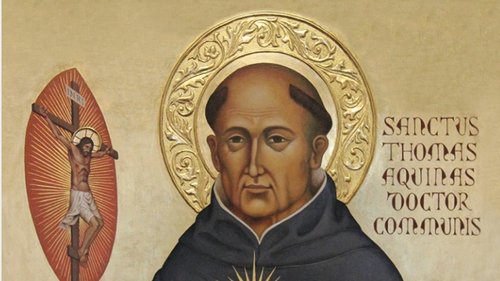Prof. Fr. Michael Baggot, LC, at the Thomistic Institute
“Aquinas After 750 Years: Still the Common Doctor?”
To mark the 750th anniversary of the death of St. Thomas Aquinas, the Thomistic Institute and the Dominican House of Studies present a major international conference on St. Thomas’s thought, featuring over 40 scholarly papers and six plenary addresses by prominent scholars from ten countries. Prof. Fr. Michael Baggot, LC, Assistant Professor of the Faculty of Bioethics, presented his paper: "A Thomistic Critique of Transhumanism’s Technocratic Paradigm."
Abstract
The technocratic mentality considers being principally in terms of production and encounters in the world meaningless raw matter awaiting the imposition of human goals. Truth is understood primarily as the exploration of the technically possible. The epistemology of the technologically feasible in turn leads to a technological imperative to surpass current constraints. Thus, the transhumanist project to overcome biological limitations is not so much a fringe interest of a tech-elite as the logical extension of a culturally well-established technocratic mentality.
Such a technocratic mentality bodes poorly for protecting the many vulnerable who fall prey to the powerplays of the stronger minority. One generation’s decisions regarding the technological manipulation of nature will reverberate through the ages to influence future people. Transhumanist neo-eugenic projects, eloquently justified in Oxford bioethicist Julian Savulescu’s famous principle of procreative beneficence, decide who will be born and this future generation’s characteristics. However, subjectivistic transhumanist affirmations of personal autonomy cannot be realized without acute social costs. Without a conviction in objective human nature and its intrinsic goods, all individuals become subject to the personal preferences of those procreators with the technological power to promote their vision of the good life. If no teleological moral law exists, then there is no moral standard to which the manipulated can appeal to defend their rights against others’ decisions.
Some critics of transhumanist radical enhancement proposals, such as philosopher Michael Sandel, insist that appreciation for the giftedness of human nature can and should be articulated in secular terms. However, as bioethicist Arthur Caplan and other secular thinkers have pointed out, pleas for respect for the moral normativity of human nature, although evocative of a stance of humility, ultimately lack adequate grounding without a metaphysical foundation.
In contrast, the Thomistic metaphysics of creation provides the necessary itinerary for the inference from the fundamental contingency of the world to its ongoing sustaining Cause. Moreover, Thomism breaks through the immanent frame to present the ultimate theoretical justification for the teleological moral order that practical reason discovers in human agency. In bioethical reflection, the Thomistic vision protects individuals against tendencies to unreasonably exalt finite goods like cognitive prowess, physical fitness, emotional contentment, or long earthly life sought in enhancement technologies above the Infinite Good. Thomism also provides the intellectual resources to incorporate enhancement technologies into a virtue-centered vision of the good life in which emerging technologies are prudently used as helpful tools for the person who knows who he is and what he is about.
Prof. Fr. Michael Baggot, LC, Assistant Professor of the Faculty of Bioethics, presented his paper: "A Thomistic Critique of Transhumanism’s Technocratic Paradigm."
Abstract
The technocratic mentality considers being principally in terms of production and encounters in the world meaningless raw matter awaiting the imposition of human goals. Truth is understood primarily as the exploration of the technically possible. The epistemology of the technologically feasible in turn leads to a technological imperative to surpass current constraints. Thus, the transhumanist project to overcome biological limitations is not so much a fringe interest of a tech-elite as the logical extension of a culturally well-established technocratic mentality.
Such a technocratic mentality bodes poorly for protecting the many vulnerable who fall prey to the powerplays of the stronger minority. One generation’s decisions regarding the technological manipulation of nature will reverberate through the ages to influence future people. Transhumanist neo-eugenic projects, eloquently justified in Oxford bioethicist Julian Savulescu’s famous principle of procreative beneficence, decide who will be born and this future generation’s characteristics. However, subjectivistic transhumanist affirmations of personal autonomy cannot be realized without acute social costs. Without a conviction in objective human nature and its intrinsic goods, all individuals become subject to the personal preferences of those procreators with the technological power to promote their vision of the good life. If no teleological moral law exists, then there is no moral standard to which the manipulated can appeal to defend their rights against others’ decisions.
Some critics of transhumanist radical enhancement proposals, such as philosopher Michael Sandel, insist that appreciation for the giftedness of human nature can and should be articulated in secular terms. However, as bioethicist Arthur Caplan and other secular thinkers have pointed out, pleas for respect for the moral normativity of human nature, although evocative of a stance of humility, ultimately lack adequate grounding without a metaphysical foundation.
In contrast, the Thomistic metaphysics of creation provides the necessary itinerary for the inference from the fundamental contingency of the world to its ongoing sustaining Cause. Moreover, Thomism breaks through the immanent frame to present the ultimate theoretical justification for the teleological moral order that practical reason discovers in human agency. In bioethical reflection, the Thomistic vision protects individuals against tendencies to unreasonably exalt finite goods like cognitive prowess, physical fitness, emotional contentment, or long earthly life sought in enhancement technologies above the Infinite Good. Thomism also provides the intellectual resources to incorporate enhancement technologies into a virtue-centered vision of the good life in which emerging technologies are prudently used as helpful tools for the person who knows who he is and what he is about.




